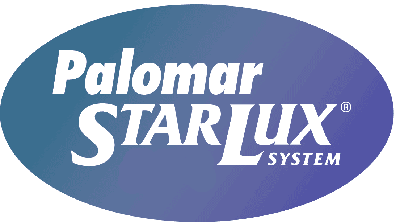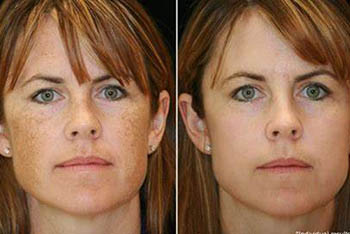IPL & Light Therapies
IPL Photorejuvenation
The Palomar Starlux is a medical-grade IPL system that is manufactured in the United States by Palomar Medical Technologies. This company has been a prominent leader in the medical cosmetic industry for over 20 years and continue to carry out extensive research and development to provide the most comfortable and effective treatments for their clients.
To deliver the most cost effective solutions our Starlux system uses its many advantages (incl):
- Large spot size for faster treatments
- High medical-strength power for best results
- Infinately variable dosage allows us to comfortably maximise dosage to each client
- High Repetition rate for faster treatments
- Patented contact-cooling for more comfortable treatments
- No need for messy gels or lotions during treatments
- Can treat most skin types
- Minimal to no down-time


What is IPL Photorejuvenation
Intense Pulsed Light (IPL) is a gentle, non-invasive treatment that improves the appearance of photoaged skin, removes age spots, most benign brown pigments and redness caused by broken capillaries.
Using our Starlux System at Elegant Image we can tailor IPL Photo rejuvenation to your individual condition and skin type, providing superior cosmetic results and high satisfaction.
How does IPL Photo rejuvenation Work
A broad spectrum of light is transmitted with the Starlux IPL handpiece through a small, smooth, transparent lightguide which gently place over your skin.
The light penetrates the tissue and is absorbed by either the blood when treating vascular lesions or the melanin when treating pigmented lesions damaging them.
The body’s natural processes then remove the injured tissue giving the skin a more even tone and texture, and a more youthful appearance.
IPL uses various wavelengths of light to target brown and red areas of skin without “downtime.”
Where on the Body Can IPL Photo rejuvenation by Used?
IPL Photo rejuvenation can be used to treat any area of the body.
The most common areas are the face, neck, chest and hands.
What Is Rosacea?
Rosacea is a common, chronic skin condition that primarily affects the facial area and is characterised by skin flushing and redness which can be transient or persistent.
Is IPL Right For You?
IPL may be the ideal treatment option for, if you:
- Want to improve the appearance of redness and rosacea
- Want to improve the appearance of brown pigmentation and age spots
- Want a procedure that has very minimal down time.
What Is an IPL Photo rejuvenation Treatment Like?
Many people can safely receive an IPL Photo rejuvenation treatment.
However, our staff will always consult with you before treatment to make sure IPL is the best treatment.
Want to Learn More About IPL Photo rejuvenation?
To schedule your consultation and learn more about IPL Photo rejuvenation, call 02 6293 2992 today or send us an email to i[email protected]
Takeaway
For a long time now, the use of IPL systems has been accepted as a safe and effective in achieving long-term results. However, like all clinical treatments, certain circumstances need to be considered and for your own safety there are some health conditions that are widely considered to be contraindications to IPL Treatment. These include:
Probable Exclusions
If you suffer from any of the listed conditions, you may not be suitable for treatment. Our aesthetician will advise the best course of action in a consultation
Psoriasis
Bleeding disorders
Severe reactions to histamines
Previous surgery such as chemical peels and laser resurfacing
Vitiligo
Pregnancy
Although there’s no evidence to suggest that an IPL treatment isn’t safe for your unborn baby, it is generally not recommended. and only with written consent from the clients GP will we perform any IPL procedure on a pregnant woman. We will advise you to wait until after you’ve had your child before considering these procedures. We understand that this can be frustrating, especially as women often become hairier during pregnancy. The good news is that this pre-natal hair growth usually disapates after birth or once breastfeeding has finished. If it doesn’t, IPL permanent hair reduction will be an option.
Breastfeeding
Our policy is that; only with written consent from the clients GP will we perform any IPL procedure on a breastfeeding. Hormonal changes introduce the risks that the procedure might not be as effective as expected and/or the client may suffers an adverse reaction.
Medication
Many medications come with side-effects, including those that will make your skin more photosensitive. This means that your skin might react more negatively to IPL treatments.
If this is the case, you might want to think of ways to get around the issue. For example, taking a break from the problematic medication may be an option or switching to an alternative treatment. Having a discussion with your GP will help determine the right course of action for your needs.
Sun tan
The sun will cause your skin to create more melanin, which is there to protect your skin from damage. However, this can cause your skin colour to become patchy and uneven, which isn’t the best start for any IPL skin treatments e.g. required changes to dosage and system settings can make it difficult to maintain uniform treatment regemins which may affect the quality of the results.
In the event of an active or severe sunburn, the procedure cannot go ahead. You’ll be expected to allow the skin to fully heal before returning for your treatment. You will be given guidance on sun rules during your preliminary consultation.
Dark skin
People with dark skin may be prevented from undertaking IPL treatments. However, if you also have a sun tan, it’s important that it fades before any work can get underway.
Keloid scarring
Keloid scarring occurs when wounds do not heal properly, and they can be especially hazardous to anyone seeking IPL treatments. The skin is usually raised, which can make it vulnerable during the procedure.
There are some cases where we might still be able to perform IPL Treatment. However, it’s essential that you are aware of the risks and fully informed before coming to a final decision.
Tattoos
Unless undergoing laser tattoo removal all areas of the skin where there is a tattoo will be avoided during IPL treatments. This is to minimise skin irritation, as well as any potential aesthetic changes to your tattoo.
Lesions, open wounds
IPL treatmentss can be especially painful in areas of the body where there are lesions or open wounds. It’s our policy to postpone the procedure until they’ve fully healed as the light can potentially slow down the healing process and lead to additional discomfort.
Herpes & cold sores
IPL treatment is possible once the herpes virus is kept under control. However, bear in mind that we will require you to ensure that prescription medication has been taken, and that the condition is in remission before any procedure.
Herpes and cold sores are treated as contagious skin diseases, so don’t be surprised if we initially turn you away. Once the problem has disappeared, you should be able to undergo the procedure.
Moles
If you have a mole, we will still with the IPL treatment. The light used aren’t on the UV spectrum, so there is no evidence to suggest they can change a mole and make it cancerous. However, we advise you to keep an eye on any visual changes that may occur and If you do see anything suspicious, make sure you inform your GP of the treatment and have it checked as soon as possible.
Recent waxing/plucking
IPL Premanet Hair Reduction requires there to be a follicle to target. If you’ve recently plucked or waxed your body, there won’t be any. We recommen that you wait two weeks before attempting IPL hair reduction. Alternatives e.g. shaving or depilatordy creams are a great bridge that gap between IPL sessions.
Depilatory creams
Depilatory creams work by dissolving the hair in a chemical substance. This is achieved using keratinocytes, which will not only kill keratin in the hair, but also in the skin. However these act as a great alternative to use in between hair removal treatments.
Epilepsy
We will always advise Light induced epilepsy sufferers not to undergo any IPL treatment. IPL procedures will not be provided unless you have a note authorising the procedure from your GP.
Hirsutism
Hirsutism is a genetic condition that sees women experiencing excessive hair growth. The hairs are generally thick and dark, making them easy to see.
IPL permanent hair reduction can be an effective way of getting rid of these unwanted hairs. It is worth bearing in mind that the procedure can take longer for hirsutism sufferers – potentially several months – and it is generally most effective on women with pale skin and dark hair.
If you have any questions about IPL Treatment and the contraindications, don’t hesitate to get in touch by calling us on 02 6293 2992 or filling in our contact form.

